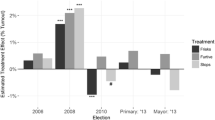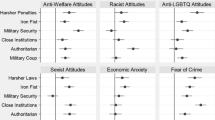Abstract
During the last twenty years numerous studies have been published regarding public support for local law enforcement agencies. These studies have typically focused on three determinants of support-the social status of the citizen, citizen fear or actual victimization of crime, and the nature or frequency of citizen-police contacts.
This somewhat exploratory research evaluates the impact of political ideology upon citizen support for law enforcement agencies. The thrust of the investigation builds upon much more limited considerations of ideology in earlier studies. An assessment and comparison of support according to absolute/diffuse measures and relative/specific measures of citizen-voter support are presented.
Political ideology is defined in the context of contemporary liberal-conservative perspectives and operationalized according to nominal (self-identification)and issue-oriented techniques.
Similar content being viewed by others
References
Albrecht, S. and Green, M. (1977) “Attitudes Toward the Police and the Larger Attitude Complex.”Criminology 15:67–86.
Baker, R., Meyer, F., Corbett, A. and Rudoni, D. (1979) “Evaluation of Police Services in Medium-Sized Cities.”Law and Policy Quarterly 1:235–248.
Bell, D. (1982) “Police Uniforms, Attitudes and Citizens.”Journal of Criminal Justice 10:45–55.
Block, R. (1970) “Support for Civil Liberties and Support for the Police.”American Behavioral Scientist 13:781–796.
Block, R. (1971) “Fear of Crime and Fear of the Police.”Social Problems 19:91–101.
Campbell, B. (1979)The American Electorate. New York: Holt, Rinehart and Winston.
Carte, G. (1973) “Changes in Public Attitudes Toward the Police: A Comparison of 1938 and 1971 Surveys.”Journal of Police Science and Administration 1:182–200.
Chackerian, R. (1974) “Police Professionalism and Citizen Evaluations: A Preliminary Look.”Public Administration Review 1974:141–148.
Converse, P. (1964) “The Nature of Belief Systems in Mass Publics.” InIdeology and Discontent, edited by D. Apter. New York: The Free Press.
Dean, D. (1980) “Citizen Ratings of the Police: The Difference Contact Makes.”Law and Policy Quarterly 2:445–471.
Easton, D. (1965)A Systems Analysis of Political Life. New York: John Wiley and Sons, Inc.
Elazar, D. (1972)American Federalism: A View from the States (2d). New York: Thomas Y. Crowell Co.
Erskine, H. (1974) “The Polls: Politics and Law and Order.”Public Opinion Quarterly 38:623–634.
Fowler, F. (1974)Citizen Attitudes Toward Local Government, Services and Taxes. Cambridge, Mass.: Ballinger Publishing Co.
Furstenberg, F. and Wellford, C. (1973) “Calling the Police: The Evaluation of Police Service.”Law and Society Review 8:393–406.
Gant, M. and Davis, D. (1984) “Mental Economy and Voter Rationality: The Informed Citizen Problem in Voting Research.”Journal of Politics 46:132–153.
Hindelang, M. (1974) “Public Opinion Regarding Crime, Criminal Justice, and Related Topics.”Journal of_ Research in Crime and Delinquency 11:101–116.
Klyman, F. and Kruckenberg, J. (1974) “A Methodology for Assessing Citizen Perceptions of Police.”Journal of Criminal Justice 2:219–233.
Koening, D. (1980) “The Effects of Criminal Victimization and Judicial or Police Contacts on Public Attitudes Toward Local Police.”Journal of Criminal Justice 8:243–249.
Lovrich, N. and Taylor, G. (1976) “Neighborhood Evaluation of Local Government Services-A Citizen Survey Approach.”Urban Affairs Quarterly 12:197–222.
Luttbegg, N. and Gant, M. (1985) “The Failure of Liberal/Conservative Ideology as a Cognitive Structure.”Public Opinion Quarterly 49:80–93.
Marenin, O. (1983a) “Voting on the Police: Support and Interest in a Small Community.”Journal of Police Science and Administration 11:97–103.
Marenin, O. (1983b) “Supporting the Local Police: The Differential Group Basis of Varieties of Support.”Police Studies 6:50–56.
McCaghy, C., Allen, I., and Colfax, J. (1968) “Public Attitudes toward City Police in a Middle-Sized Northern City.”Criminology 6:14–22.
McCloskey, H. (1958) “Conservatism and Personality.”American Political Science Review 50:27–45.
Metcalf, L. and Dolbeare, K. (1985)Neopolitics-American Political Ideas in the 1980’s. New York: Random House.
Miller, W. (1973) “Ideology and Criminal Justice Policy: Some Current Issues.”Journal of Criminal Law and Criminology 64:141–162.
Nie, N., Verba, S. and Petrocik, J. (1976)The Changing American Voter. Cambridge: Harvard University Press.
Parks, R. (1975) “Complimentary Measures of Police Performance.” InPublic Policy Evaluation, edited by K. Dolbeare. Beverly Hills: Sage Publications.
Parks, R. (1976) “Police Response to Victimization: Effects on Citizen Attitudes and Perceptions.” InSample Surveys of the Victims of Crime, edited by W. Skogan. Cambridge, Mass.: Ballinger Publishing Co.
Peek, C., Alston, J. and Lowe, G. (1978) “Comparative Evaluation of the Local Police.”Public Opinion Quarterly 42:371–379.
Perkins, J. (1982) “Ideology in the South: Meaning and Bases among Masses and Elites.” InContemporary Southern Political Attitudes and Behavior, edited by L. Moreland. New York: Praeger Publishing Co.
Poister, T. and McDavid, J. (1978) “Victims’ Evaluations of Police Performance.”Journal of Criminal Justice 6:133–149.
President’s Commission on Law Enforcement and the Administration of Justice. (1967)The Challenge of Crime in a Free Society. Washington: Government Printing Office.
Ross, R. and Snortum, J. (1982) “Public Priorities and Police Policy in a Bicultural Community.”Police Studies 5:18–30.
Scaglion, R. and Condon, R. (1980) “Determinants of Attitudes Toward City Police.”Criminology 17:485–504.
Sharp, E. (1981) “Citizen Perception of Police Service Delivery: A Look at Some Consequences.”Policy Studies Journal 9:971–981.
Skogan, W. (1975) “Public Policy and Public Evaluations of Criminal Justice System Performance.” InCrime and Criminal Justice, edited by J. Gardiner. Lexington, Mass.: D.C. Heath and Co.
Smith, P. and Hawkins, R. (1973) “Victimization, Types of Citizen-Police Contacts, and Attitudes Towards the Police.”Law and Society Review 8:135–152.
Stinchcombe, A., Adams, R., Heimer, C., Scheppele, K., Smith, T. and Taylor, D. (1980)Crime and Punishment: Changing Attitudes in America. San Francisco: Jossey-Bass.
Sullivan, J., Pierson, J. and Marcus, G. (1978) “Ideological Constraint in the Mass Public: A Methodological Critique and Some New Findings.”American Journal of Political Science 22:233–249.
Thomas, C. and Hyman, J. (1977) “Perceptions of Crime, Fear of Victimization, and Public Perceptions of Police Performance.”Journal of Police Science and Administration 5:305–317.
Tyler, T. (1984) “The Influence of Citizen Satisfaction with Police Behavior upon Police Support.”Law and Policy Quarterly 6:329–338.
Walker, D. (1977) “Citizen Contact and Legal System Support.”Social Science Quarterly 58:3–14.
White, M. and Menke, B. (1978) “A Critical Analysis of Surveys on Public Opinions Toward Police Agencies.”Journal of Police Science and Administration 6:204–218.
White, M. and Menke, B. (1982) “On Assessing the Mood of the Public Toward the Police: Some Conceptual Issues.”Journal of Criminal Justice 10:211–230.
Wilson, J. (1968)Varieties of Police Behavior. Cambridge, Mass.: Harvard University Press.
Author information
Authors and Affiliations
Rights and permissions
About this article
Cite this article
Brown, J.C. Absolute and relative support among citizen-voters for local law enforcement agencies: Correlates with selected dimensions of political ideology. AJCJ 10, 140–162 (1986). https://doi.org/10.1007/BF02887467
Published:
Issue Date:
DOI: https://doi.org/10.1007/BF02887467




